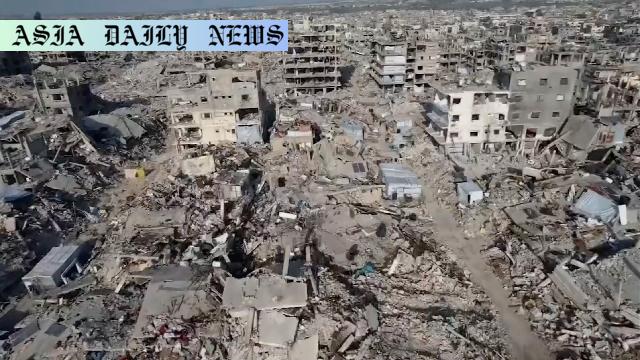Gaza Reconstruction: Arab leaders propose a $53B plan to rebuild Gaza, facing criticism from Israel and lack of clear funding.
Arab leaders propose a $53B Gaza reconstruction plan over 5 years.
Israel criticizes the plan, calling it less favorable than alternative solutions.
Hamas welcomes the proposal, urging measures for its success.
Details of funding for the project remain unclear.

Introduction: A Divisive Proposal for Gaza
The recent summit of the League of Arab States in Egypt has ushered in a proposal to reconstruct and rebuild the Gaza Strip, which has faced years of devastation and conflict. This $53 billion plan envisions a phased reconstruction over a five-year period, aimed at addressing the crumbling infrastructure and improving living standards for Palestinians, while preventing displacement of Gazans. The initiative begins with clearing rubble and creating temporary housing units, followed by more ambitious projects such as the construction of an airport and seaports.
However, the plan has been met with significant criticism and skepticism, particularly from Israel. The Israeli foreign ministry has dismissed the initiative, pointing to an alternative solution earlier suggested by the United States, which included the resettlement of Gaza residents elsewhere. Despite this conflicting stance, Hamas has welcomed the Arab leaders’ plan and has called for all necessary resources to ensure its success. Complications surrounding the funding and logistics of the project further cloud its prospects.
Challenges to Implementation: Funding and Political Divides
The ambitious reconstruction plan presents the challenge of acquiring enough financial support and maintaining sustained political will. The projected cost of $53 billion is staggering, and Arab leaders have not yet provided concrete details on how this amount will be financed. This issue of funding remains one of the plan’s most significant weaknesses, as no external financial commitments have been secured to date.
Additionally, the political divide adds further obstacles. Israel’s outright rejection of the plan stems from its insistence on what it deems a “freedom of choice” proposal that involves the resettlement of Gazans. The Arab states, on the other hand, stress the importance of rebuilding Gaza without displacing its residents, illustrating a fundamental disagreement in vision. Such differences could undermine even initial progress in debris removal and temporary housing, the first stage of the plan.
Support and Hope from Hamas
While Israel critiques the plan, Hamas, a dominant force in Gaza, has supported the initiative. In a statement released following the proposal’s endorsement, Hamas expressed hope that the plan would succeed and called on contributing nations to provide the resources necessary for its implementation. For Hamas, the reconstruction plan represents a rare opportunity to stabilize living conditions and rebuild vital infrastructure in a territory hard hit by conflict.
It remains uncertain whether Hamas’s backing is sufficient to persuade hesitant or opposing stakeholders. Although the group’s support could mobilize grassroots approval among Gazans, international political and financial support will be critical for the project’s success.
Why Israel Opposes the Reconstruction Initiative
Israel’s opposition to the reconstruction proposal stems from its preference for the United States’ alternative plan, which focuses on resettling Gazans outside the territory. The Israeli foreign ministry claimed that the Arab League’s approach denies Gazans the ‘freedom of choice’ inherent in the US vision. The ministry also suggested that the Arab plan lacked pragmatism, as it does not address concerns about Hamas and the potential for renewed conflict in a rebuilt Gaza.
From the Israeli perspective, rebuilding Gaza without addressing broader security concerns might lead to further instability in the region. The presence of Hamas, which Israel regards as a terrorist organization, complicates matters further for any reconstruction initiative. For Israel, considerations of security appear to outweigh any humanitarian benefits that the reconstruction project might achieve.
The Path Ahead: Uncertain Outcomes
The ongoing debate regarding Gaza’s reconstruction highlights the intricate balance of political, economic, and humanitarian factors at play in the region. While the Arab League’s proposal represents a significant step toward addressing the humanitarian crisis in Gaza, skepticism from Israel, alongside the glaring absence of funding solutions, raises serious questions about the plan’s feasibility.
If the initiative is to succeed, it will require a concerted effort from key stakeholders both regionally and internationally. Concrete commitments to funding, as well as a clear roadmap that addresses political and security concerns, will be essential. For now, the spotlight remains on whether the competing visions—rebuilding Gaza versus resettling its people—can find common ground for the sake of peace and stability.
Commentary
A Humanitarian Effort in the Face of Political Resistance
The Gaza reconstruction proposal by Arab leaders represents a comprehensive attempt to rebuild and restore a region deeply affected by conflict. However, the challenges it faces are undeniable, from securing billions in funding to harmonizing the diverse political interests of stakeholders like Israel, Hamas, and the broader international community. This effort stands as a humanitarian endeavor first and foremost, yet its execution depends on diplomacy and cooperation, two qualities often in short supply in this volatile region.
Israel’s Concerns: Valid or Counterproductive?
Israel’s criticism of the reconstruction plan highlights its focus on long-term security as opposed to immediate humanitarian relief. While the concern about instability and Hamas’s role in Gaza is valid, outright dismissal of the Arab League’s initiative could be viewed as counterproductive. Peace and security in the region are intrinsically tied to the well-being and stability of the Palestinian population. By opposing efforts to rebuild Gaza without offering a viable alternative, Israel risks further alienating its neighbors and perpetuating a cycle of resentment and violence.
The Cost of Inaction
If the Gaza reconstruction initiative fails due to political opposition or lack of funding, the consequences will likely be devastating for the Gaza Strip. With poverty and destruction already widespread, delaying much-needed rebuilding efforts could worsen humanitarian conditions, fueling further discontent and conflict. Both regional and international actors must recognize the urgency of this situation and prioritize collaborative solutions over unilateral interests. Rebuilding Gaza represents not only a humanitarian imperative but also a potential foundation for fostering dialogue and long-term peace in the region.


